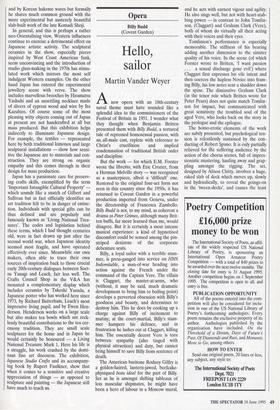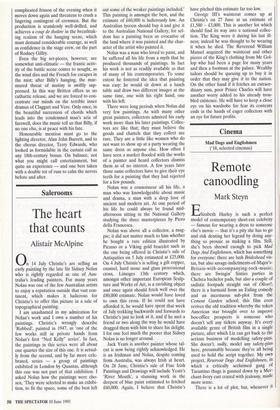Opera
Billy Budd (Covent Garden)
Hello, sailor
Martin Vander Weyer
Anew opera with an 18th-century naval theme must have sounded like a splendid idea to the commissioners of the Festival of Britain in 1951. I wonder what they thought when Benjamin Britten presented them with Billy Budd, a tortured tale of repressed homosexual passion, with an. all-male cast, replete with reference to Christ's crucifixion and implied condemnation of traditional British order and discipline.
But the work — for which E.M. Forster wrote the libretto, with Eric Crozier, from a Herman Melville story — was recognised as a masterpiece, albeit a 'difficult' one. Restored to the original four-act form not seen in this country since the 1950s, it has returned to Covent Garden in a powerful production imported from Geneva, under the directorship of Francesca Zambello. Billy Budd is not, to my mind, as coherent a drama as Peter Grimes, although many Brit- ten buffs, far more learned than me, would disagree. But it is certainly a most intense musical experience: a kind of hypnotised discomfort could be sensed among the pin- striped denizens of the corporate debenture seats.
Billy, a loyal sailor with a terrible stam- mer, is press-ganged into service on HMS Indomitable, a man-of-war heading into action against the French under the command of the Captain Vere. The villain is Claggart, the master-at-arms, who (without, it may be said, much dramatic development to bring him to boiling point) develops a perverted obsession with Billy's goodness and beauty, and determines to destroy him. This he does by cooking up a charge against Billy of incitement to mutiny; at the court-martial, Billy's stam- mer hampers his defence, and in frustration he lashes out at Claggart, killing him. The essentially decent Vere is torn between sympathy (also tinged with physical attraction) and duty, but cannot bring himself to save Billy from sentence of death.
The American baritone Rodney Gilfry is a golden-haired, lantern-jawed, beefcake- physiqued beau ideal for the part of Billy. Set as he is amongst shifting tableaux of less muscular shipmates, he might have been a hero of labour in a Moscow mural, and he acts with earnest vigour and agility. He also sings well, but not with heart-stab- bing power — in contrast to John Tomlin- son, (Claggart) and Graham Clark (Vere), both of whom do virtually all their acting with their voices and their eyes.
Tomlinson's performance is especially memorable. The stiffness of his bearing adding another dimension to the sinister quality of his voice. In the scene (of which Forster wrote to Britten, 'I want passion . . . a sexual discharge gone evil') where Claggart first expresses his vile intent and then coerces the hapless Novice into fram- ing Billy, his low notes sent a shudder down the spine. The diminutive Graham Clark (in the tenor role which Britten wrote for Peter Pears) does not quite match Tomlin- son for impact, but communicated with great sensitivity the troubled soul of the aged Vere, who looks back on the story in the prologue and the epilogue.
The homo-erotic elements of the work are subtly presented, but psychological ten- sion is relentlessly sustained by the con- ducting of Robert Span°. It is only partially relieved for the suffering audience by the action of the chorus scenes, full of impres- sionistic mustering, hauling away and grap- pling amongst the rigging. The set, designed by Alison Chitty, involves a huge, raked slab of deck which moves up, slowly and hydraulically, to reveal the goings-on in the `tween-decks', and causes the least complicated frisson of the evening when it moves down again and threatens to crush a lingering contingent of crewmen. But the production is seamlessly well-drilled, and achieves a coup de theatre in the breathtak- ing realism of the hanging scene, which must demand considerable courage, as well as confidence in the stage crew, on the part of Rodney Gilfry.
Even the big set-pieces, however, are somewhat anti-climatic — the frantic activ- ity of the battle scene comes to nought, as the wind dies and the French foe escapes in the mist; after Billy's hanging, the mur- mured threat of mutiny is swiftly sup- pressed. In this way Britten offers us no cathartic release, and we are forced to con- centrate our minds on the terrible inner dramas of Claggart and Vere. Only once, in the beautiful succession of chords which leads into the condemned man's aria of farewell, does the music tell us that Billy, if no one else, is at peace with his fate.
Honourable mention must go to the lighting director, Alan John Burrett, and to the chorus director, Terry Edwards, who looked as formidable in the curtain call as any 18th-century bosun. On balance, not what you might call entertainment, but quite an experience — and one best taken with a double tot of rum to calm the nerves before and after.



































































 Previous page
Previous page